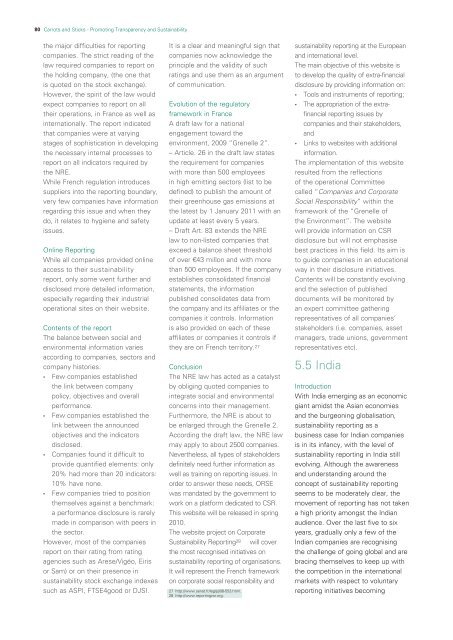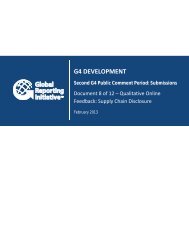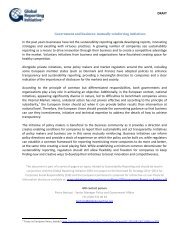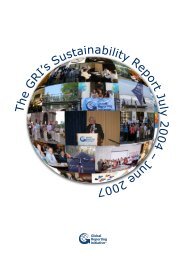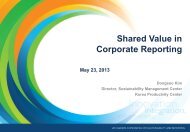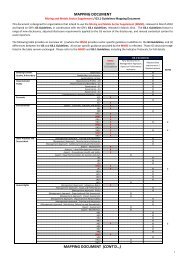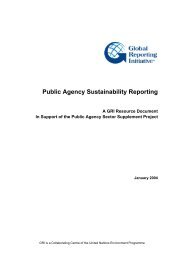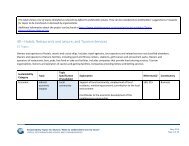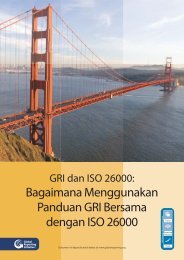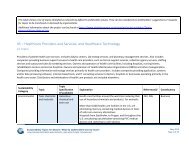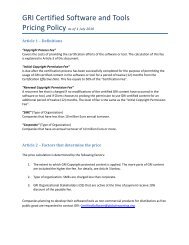CARROTS AND STICKS – PROMOTING ... - Global Reporting Initiative
CARROTS AND STICKS – PROMOTING ... - Global Reporting Initiative
CARROTS AND STICKS – PROMOTING ... - Global Reporting Initiative
Create successful ePaper yourself
Turn your PDF publications into a flip-book with our unique Google optimized e-Paper software.
80 Carrots and Sticks - Promoting Transparency and Sustainability<br />
the major difficulties for reporting<br />
companies. The strict reading of the<br />
law required companies to report on<br />
the holding company, (the one that<br />
is quoted on the stock exchange).<br />
However, the spirit of the law would<br />
expect companies to report on all<br />
their operations, in France as well as<br />
internationally. The report indicated<br />
that companies were at varying<br />
stages of sophistication in developing<br />
the necessary internal processes to<br />
report on all indicators required by<br />
the NRE.<br />
While French regulation introduces<br />
suppliers into the reporting boundary,<br />
very few companies have information<br />
regarding this issue and when they<br />
do, it relates to hygiene and safety<br />
issues.<br />
Online <strong>Reporting</strong><br />
While all companies provided online<br />
access to their sustainability<br />
report, only some went further and<br />
disclosed more detailed information,<br />
especially regarding their industrial<br />
operational sites on their website.<br />
Contents of the report<br />
The balance between social and<br />
environmental information varies<br />
according to companies, sectors and<br />
company histories.<br />
• Few companies established<br />
the link between company<br />
policy, objectives and overall<br />
performance.<br />
• Few companies established the<br />
link between the announced<br />
objectives and the indicators<br />
disclosed.<br />
• Companies found it difficult to<br />
provide quantified elements: only<br />
20% had more than 20 indicators:<br />
10% have none.<br />
• Few companies tried to position<br />
themselves against a benchmark:<br />
a performance disclosure is rarely<br />
made in comparison with peers in<br />
the sector.<br />
However, most of the companies<br />
report on their rating from rating<br />
agencies such as Arese/Vigéo, Eiris<br />
or Sam) or on their presence in<br />
sustainability stock exchange indexes<br />
such as ASPI, FTSE4good or DJSI.<br />
It is a clear and meaningful sign that<br />
companies now acknowledge the<br />
principle and the validity of such<br />
ratings and use them as an argument<br />
of communication.<br />
Evolution of the regulatory<br />
framework in France<br />
A draft law for a national<br />
engagement toward the<br />
environment, 2009 “Grenelle 2”.<br />
<strong>–</strong> Article. 26 in the draft law states<br />
the requirement for companies<br />
with more than 500 employees<br />
in high emitting sectors (list to be<br />
defined) to publish the amount of<br />
their greenhouse gas emissions at<br />
the latest by 1 January 2011 with an<br />
update at least every 5 years.<br />
<strong>–</strong> Draft Art. 83 extends the NRE<br />
law to non-listed companies that<br />
exceed a balance sheet threshold<br />
of over €43 millon and with more<br />
than 500 employees. If the company<br />
establishes consolidated financial<br />
statements, the information<br />
published consolidates data from<br />
the company and its affiliates or the<br />
companies it controls. Information<br />
is also provided on each of these<br />
affiliates or companies it controls if<br />
they are on French territory. 27<br />
Conclusion<br />
The NRE law has acted as a catalyst<br />
by obliging quoted companies to<br />
integrate social and environmental<br />
concerns into their management.<br />
Furthermore, the NRE is about to<br />
be enlarged through the Grenelle 2.<br />
According the draft law, the NRE law<br />
may apply to about 2500 companies.<br />
Nevertheless, all types of stakeholders<br />
definitely need further information as<br />
well as training on reporting issues. In<br />
order to answer these needs, ORSE<br />
was mandated by the government to<br />
work on a platform dedicated to CSR.<br />
This website will be released in spring<br />
2010.<br />
The website project on Corporate<br />
Sustainability <strong>Reporting</strong> 28 will cover<br />
the most recognised initiatives on<br />
sustainability reporting of organisations.<br />
It will represent the French framework<br />
on corporate social responsibility and<br />
27 http://www.senat.fr/leg/pjl08-553.html.<br />
28 http://www.reportingcsr.org.<br />
sustainability reporting at the European<br />
and international level.<br />
The main objective of this website is<br />
to develop the quality of extra-financial<br />
disclosure by providing information on:<br />
• Tools and instruments of reporting;<br />
• The appropriation of the extrafinancial<br />
reporting issues by<br />
companies and their stakeholders,<br />
and<br />
• Links to websites with additional<br />
information.<br />
The implementation of this website<br />
resulted from the reflections<br />
of the operational Committee<br />
called “Companies and Corporate<br />
Social Responsibility” within the<br />
framework of the “Grenelle of<br />
the Environment”. The website<br />
will provide information on CSR<br />
disclosure but will not emphasise<br />
best practices in this field. Its aim is<br />
to guide companies in an educational<br />
way in their disclosure initiatives.<br />
Contents will be constantly evolving<br />
and the selection of published<br />
documents will be monitored by<br />
an expert committee gathering<br />
representatives of all companies’<br />
stakeholders (i.e. companies, asset<br />
managers, trade unions, government<br />
representatives etc).<br />
5.5 India<br />
Introduction<br />
With India emerging as an economic<br />
giant amidst the Asian economies<br />
and the burgeoning globalisation,<br />
sustainability reporting as a<br />
business case for Indian companies<br />
is in its infancy, with the level of<br />
sustainability reporting in India still<br />
evolving. Although the awareness<br />
and understanding around the<br />
concept of sustainability reporting<br />
seems to be moderately clear, the<br />
movement of reporting has not taken<br />
a high priority amongst the Indian<br />
audience. Over the last five to six<br />
years, gradually only a few of the<br />
Indian companies are recognising<br />
the challenge of going global and are<br />
bracing themselves to keep up with<br />
the competition in the international<br />
markets with respect to voluntary<br />
reporting initiatives becoming


